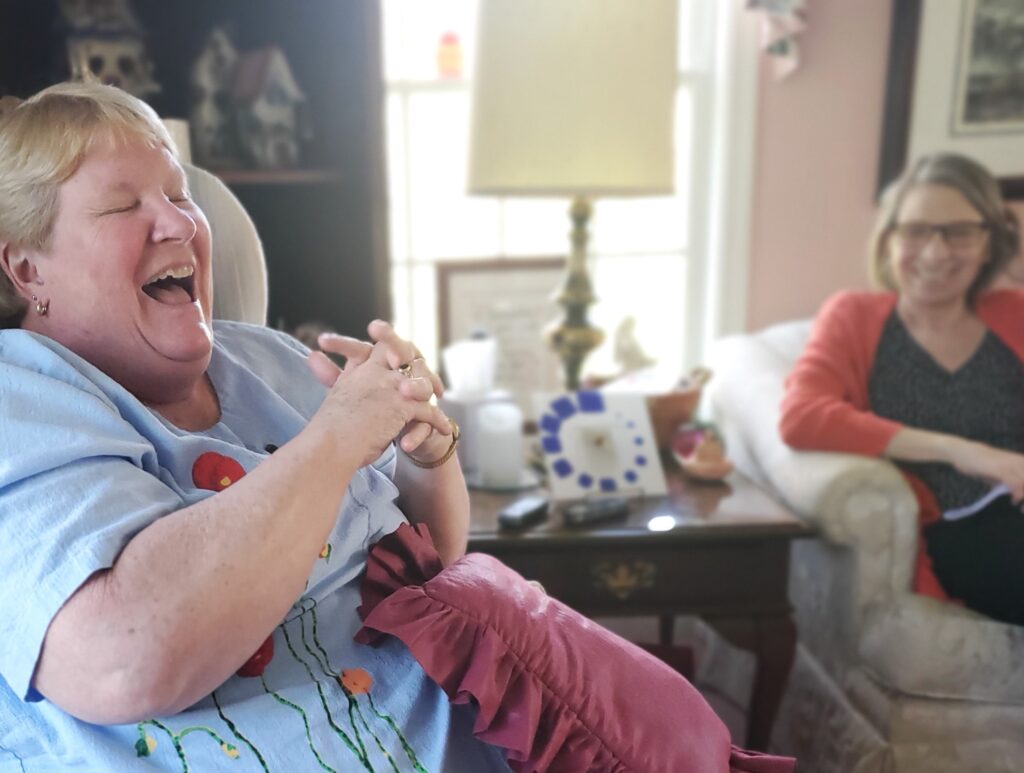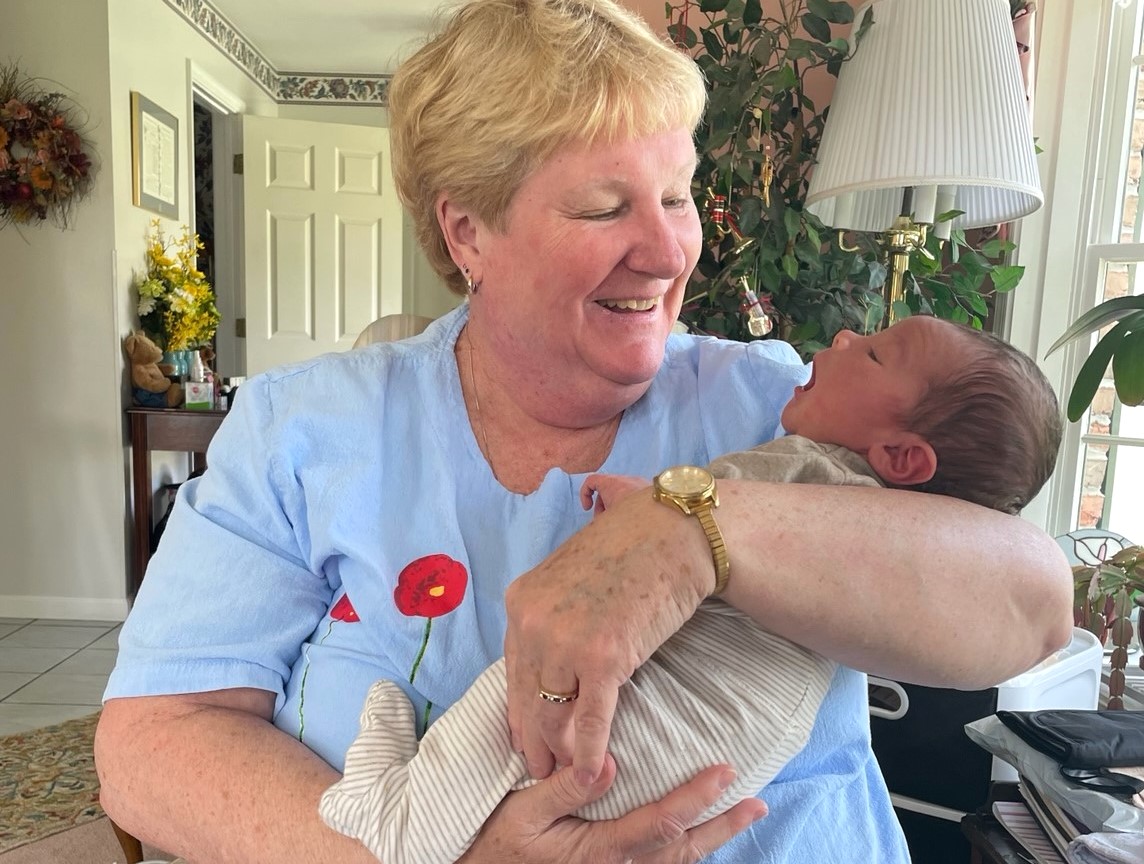It was well over a year ago when State College veterinarian Erin Hartzler sent me a recommendation. According to Hartzler, I should choose a woman named Karen Foard as my “Mother of the Year” for 2023.
And indeed, this suggestion was a great one. As I knew then and know much better now, Karen Foard is a heroine in the world of breastfeeding. A conservative estimate suggests she has counseled more than 5,000 women—mostly in one-to-one-plus-baby sessions—and provided a remarkable range of medical insights and emotional support.
There was just one “problem” with Hartzler’s idea. Unbeknownst to her, I had already begun working on a Mom of the Year story about Susan Strauss—a single woman and Penn State professor who had adopted six kids from Ethiopia in less than two years and raised them to be successful young adults. Strauss is amazing, and I trust last year’s story about her has inspired many folks to consider adoption.
Karen Foard, however, is also an incredible individual. And that’s why it’s my privilege and joy to honor her as the 2024 “Mother of the Year” in the State College area. Obviously, all of our moms deserve appreciation during this Mother’s Day weekend, and one way to focus attention on all of them is to highlight one remarkable standard bearer each year. (See the list of the five previous honorees at the end of this story.) So here’s a woman who is not only the mother of four, grandmother of 10 (soon 11) and a retired elementary school educator, but also a “mother to the mothers” via breastfeeding guidance.
AMAZING IMPACT
At first glance, the work of Karen Foard might not seem so exceptional. After all, our region has other lactation consultants. But who else has done it here for nearly 40 years, given hope to thousands during consults in her own home and attracted such appreciation?
“Karen is a legend,” says Sarah Herr, one of her clients. “Anyone and everyone who’s in State College, if you ask anyone for lactation help, they’ll say, ‘Oh, Karen Foard.’ She is a mom, she is a cheerleader and she is a realist.”
As for Hartzler, she says, “Being a new mom…with some challenges with my kid not being able to breastfeed right away, it’s something completely new and you’re feeling so powerless. Then you work with Karen and she spent like 45 minutes with me and completely changed everything. I think it is so fitting to recognize her on Mother’s Day.”

ANOTHER OBSERVER
I’m always intrigued by people who do something better than most…longer than most…with more joy than most. But to unlock the mysteries of Karen Foard, I knew I was going to need help. Let’s just say that breastfeeding is never going to join wrestling or bass fishing on my list of favorite subjects.
So I turned to my dear wife, Kathy, mother of our three sons and a successful past practitioner of the art. She joined me in interviewing Karen, and she also spoke with several of our subject’s grateful clients. Here are Kathy’s observations:
“When I walked into Karen Foard’s front room, the first thing I noticed was a pair of overstuffed wing back chairs on either side of a bay window. A baby scale sat on the piano bench. There were decorated pillows everywhere. I thought, ‘This must be where she does her consultations,’ and I was right. Those chairs are famous among her many current and former clients.
“But, of course, Karen herself is more famous than any of her furnishings or decorations. When I talked with Alissa West, a brand new mom, I could tell how much she appreciated Karen’s expert guidance in how to nurse Jovie, her one-month old baby girl.
“‘Karen and I taught together at Radio Park Elementary,’ Alissa told me. ‘I joked that she was going to be on speed dial when I became pregnant. But then it became serious! I don’t think I could have gotten through the first week without Karen.
“‘At the hospital things were going well but I didn’t have my milk in yet. And then when I got home and tried to breastfeed, the baby would just fall asleep. As soon as we walked into her house, Karen noticed that the baby was jaundiced. During that first week, Karen was like my 911. I was anxious about what is normal, what do we do until Jovie’s not jaundiced, and is she getting enough nutrition?
“She just has so many tips and tricks of how to make it good. She is truly a superhero.”
WHAT MOTIVATES HER?
During our hour-plus conversation with Karen, both Kathy and I were struck by her sublime sense of commitment to moms and their newborns. What makes her tick and what keeps her ticking?
Well, first, she’s crazy about babies and she freely admits it. “Oh, it’s a fix,” she says, “and there’s nothing like it. They are adorable and while they’re not all that interactive in those first few days, their little humanness is a miracle. And, oh, when that first smile comes and it melts your heart…”
Also, her faith factors in as she facilitates a practice that she believes is a gift from her Creator. Noting the physiological plusses for the baby and the psychological benefits to mother and child, she says, “Human milk for human babies is what has been designed. This is what God intended but just like with a lot of other things, humans can muck it up.” (Karen and her husband, Steve, are among the founding members of Emmanuel Lutheran Church but, of course, she serves moms from all backgrounds and beliefs.)
Finally, this veteran breastfeeding coach mentions her own personal gain. “I really, really do love to be appreciated and needed,” she says. “So I get a great deal of satisfaction when people let me be a part of their new journey. And providing lactation support has allowed me to feel like I belong to a community. I wish everybody had that chance to feel so wanted.”

HOW SHE HELPS
Of course, the majority of new moms and nursing babies are able to create symbiotic success with little or no expert input. Karen sees those who are struggling—physiologically, emotionally or both. What are some of her helping strategies?
She starts with a mindset of anticipated success. “Some moms will come to me and say, ‘I want to try to breastfeed,’ but I will usually suggest a change of mindset to, “I want to breastfeed.’ Because we can make it work in a variety of different ways.”
Next, she deals with practical factors such as the angle of the infant’s face toward the mom. “It’s like playing pool,” she explains. “If you don’t shoot at the pocket at the right angle, the ball isn’t going in.”
Most importantly, she focuses on the top priority: feed the baby. “If the baby can’t nurse,” she says, “we still have to feed the baby. So if we want breastfeeding to succeed, we’ve got to pump milk or hand express to buy time.” In many cases, she notes, when a baby fails to gain weight, the mom will appropriately be told to use formula. But then, says Karen, “if they don’t also get told to pump, then by the time the baby is better (at nursing), mom’s milk supply has gone down the tubes. So just hearing that message of pumping is extremely important.”
And, of course, Karen has other strategies to fit certain situations. “I can think of a situation that we just went through,” she says. “This baby was a decent sucker but mom just didn’t have the milk. So we used something called a ‘Five French feeding tube.’ It’s a tube the diameter of a pencil point that we can slip into this baby’s mouth while they’re on the breast. The other end is in a bottle of milk. So they are suckling on the breast but not necessarily eating from the breast. That mom, though, is still having the breastfeeding experience—it’s not just about the milk.”
WORKING MOMS?
So what about the moms who must return to work after maternity leave? Of course, Karen’s realism equips her to understand the economic realities. “It might not only be the income that keeps them working,” she notes, “but some moms’ jobs are the source of the family’s medical insurance.”
On the other hand, many clients will say something like this to Karen: “This baby has just changed my life. I can’t believe I’m so in love and I don’t know if I want to go back to work.” Whether it’s because of the mom’s awareness of health benefits to the baby, the emotional tenderness of the nursing relationship or the dynamic of the “love hormone” (oxytocin) that is released while nursing, many clients want to continue nursing. Thus Karen seeks to help a mom find ways to continue her breastfeeding after returning to the workplace—for example, by pumping her own milk.
INVOLVING THE DADS
Karen is also a realist when it comes to new fathers who arrive at her home. Most want to be supportive of breastfeeding yet often feel helpless at how little prior information they have. (None of us learn about this in school!)
The Bucknell University graduate really wants this dad to learn and participate in the process as well. It turns out that he has a special vantage point for observing the process, a point she illustrates by impersonating a nursing mom. “This is the mom’s angle of looking down,” she says while pointing from her eyes to her chest, “and she does not see some of the subtleties that are making it harder. So when the dad comes for the consult, I include him in it and ask, ‘What do you see?’ Then he can help troubleshoot when they get home.”
Karen will never forget one experience years ago that involved a new dad. “I’m sitting here,” she says, “and the mom is sitting there—she was somebody I had worked with at school—and her husband was over there. This mom came in and it had been breastfeeding hell for her. Her nipples were hurting, and she had not had a feed since she came home [from the hospital] that felt good. So she’s a wreck, she’s distraught.
“But for this one, I had the magic latch tweak button and we got this baby on with no pain. He was chowing down, and I look over at the dad and there’s tears. He had been so immersed in her agony and pain and now he could see her having the joy of it. And that brings tears to my eyes because he was the personification of breastfeeding support. He was there for her in everything and then he was so celebratory.”
DEALING WITH ‘FAILURE’
But are there times when a baby can’t be taught to latch on and suck? Or are there times when a new mother can’t produce enough milk to nurture her baby? Unfortunately, the answers are “yes” and “yes.” But our hero, Karen Foard, is well-prepared to make the best of such difficult situations. And that begins with her empathy toward the mom.
Says Karen, “It’s heart-wrenching. Part of my job with these situations that don’t go as planned is to remind a new mom about some of the aspects of breastfeeding that still apply. Lots of in-arms time. Lots of touching, lots of grooming. That feeling of knowing that you are a baby’s anchor is still something you can have even if it’s not actual mouth-attached-to-nipple-moving-milk.
“So it’s my job to help mom feel that and also giving them permission to grieve this situation. That’s a part of being a lactation consultant. It’s important to have somebody to talk with about those feelings. As much as it is a yearning for moms to experience breastfeeding, sometimes it doesn’t work out and we have to transition to a different reality that isn’t bad, just different.”
HER FAMILY COMMITMENT
How did Karen’s work with breastfeeding impact her own family? Fortunately, she did 99% of that work at home, and the Foards’ house was configured to serve the family’s needs and Karen’s consults. Of course, she did all she could to preserve time with the family, but there have been times when a distraught mother of a four-day-old infant would call on Thanksgiving or Christmas. What would Karen do? “I just answer the phone!”
“I couldn’t do these things without a supportive family,” says Karen. “That’s for sure. “The kids (Abbey, Ellie, Lorie and Andy) were good at self-entertaining. But when they needed me, they’d come and get me because I was home. And Steve, of course, is a saint because there have been a lot of interrupted family times.”
Steve, married to Karen since 1979, offers a perspective from across the decades. “A lot of people have come through the front door,” he says of Karen’s passion, “with lots of successes and some frustrations. But she’s been doing this for so many years… This is her life and this is just part of our family life, too. There are days when there are no calls and there are days and weeks when it’s constant. But it’s good. It’s been very good.”

PREVIOUS “MOTHER OF THE YEAR” HONOREES
Sue Paterno (2019). Not only did the wife of Coach Joe Paterno raise five children and send them all to Penn State, but she gave motherly support and one-to-one tutoring to at least 60 of her husband’s football players.
Kim Sublett (2020) is the mother of three biological children, six adopted children and one grandchild. Her mothering skills also show up big-time in the life of Calvary Church Penns Valley where her husband, Stacy Sublett, is the pastor.
Lydia Abdullah (2021) is the mother of two and grandmother of three. She is legendary for the motherly hugs she has dispensed in her family, in her church (Unity Church of Jesus Christ) and within various Penn State departments where she served as a staff member for 42 years.
Joyce Porter (2022) has raised 14 children—nine biological and five adopted—including two sets of twins and one child with special needs. Her love for kids is boundless.
Susan Strauss (2023). As mentioned above, Susan adopted six young children in less than two years and none of them spoke English. Today, all have completed high school and three have graduated from college, all from Penn State.



